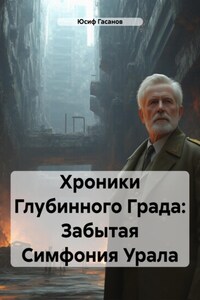Chapter 1: The Mystery of Reflection
![]()
Upon arrival, Ruthra was once again convinced of the peculiar morality of the underworld. It lived according to its own canons, which were based on the principle that no one would fly from here to space. With the implication that space was everything but here.
No one met them at the "central" station. The machine invited them to the booths for washing, disinfection and changing clothes. It turned out that there were a lot of them, six opened. They were walled in merging from the whiteness of the walls. Five minutes later everyone was assembled, in front of the main entrance.
The machine "looked through" everyone for the presence of data known only to "him" and issued: "Access confirmed."
They went into the so-called main trunk corridor. And no one met them there – everyone was busy doing their own thing.
– What are we going to do? – The operative asked.
– Now," Ruthra replied.
He contacted Isa mentally, demanding to be connected to Jarovitovich. After about ten seconds, she answered:
– The chapter is busy and can't make it out for a session.
– Then ask what the members of the incoming operational staff should do? – Ruthra asked aloud.
Everyone was silent, they knew he was communicating through the system with the Commandant.
– The command is for everyone to take their seats according to the staff schedule," Isa replied.
– That's it? – Ruthra asked in surprise.
– There were no other teams," she replied in her nonchalant manner.
– All right, everyone to your posts, I'll contact you," Ruthra commanded and headed for Jarovitovich.
Jarowitowicz was not at his place, Isa reported that he was in town, in the meeting hall.
– What town? Up there?
– No, in the city, here.
– Is there a town here?
– What did you see behind the studio?
– Is he real?
– Otherwise, how would you see it? It's virtual, but it's still real.
– Can I go in there?
– Yes, of course.
– What line?
– Center. The emblem on the door is the same.
Ruthra remembered that there was an emblem in the shape of a TV tower.
– A pass through the studio?
– The main entrance is from the lower level. If you want to go through.
– Okay, got it.
Ruthra found the right line and looked for the door. The studio was the same as it had been in the virtual. With thoughts of how it could all be made to make one see in a dream what one did not see in real life – he walked on, through the door into the "city". Neither habit, nor reflexes, nor training, nor a sense of complete adaptation to the unbelievable helped. Ruthra froze. It was not what he saw that surprised him, not the wave of familiar chains of inferences that changed his view of existence and reality, but the realization that "they" were all connected: this was a separate world, he and others like him would always be strangers to "them. There was no need to look for conspirators, they were all of the same color, inhabitants of another world, with their own thoughts, feelings, understanding of justice and the meaning of life. Ruthra realized all this because he felt how long it had been since he had seen the real (as he understood it) world, even though he had been here for days. Now Yarovitovich, Vyacheslav, Avvakum, Olga, the doctor and Alikhanov were more understandable to him.
The "city" was full of people, bustling with life, and Ruthra was no longer surprised or concerned that there were so many of them, all of them doing something very important, here and not upstairs. One could think and think and think about how distorted the citizens who didn't know about power, government, and secrets were, but it was still impossible to realize the full extent of the 'real reality'.
The abundance of light made Ruthra squint a little. If a man had fallen asleep somewhere upstairs and been transported here and then woken up, he would have thought he was in an ordinary multi-level shopping mall. There were no windows, but instead huge screens showing landscapes like those in the cabin, giving the impression that beyond the windows were forests, fields, seas, mountains, meadows, streets, parks, the same rows of streets, the same hum. Ruthra stepped onto the balcony.
– Where are you going? – Isa asked.
– Where, where, to Yarovitovich.
– You can't go into the city in working form.
Ruthra looked at his jumpsuit and the people of the 'city', they were in civilian clothes.
– Where's my stuff?
– In your quarters.
– Where is she? You think I remember?
– Follow the green line to cabin 4-23.
Ruthra turned around and walked back down the corridor, found the green line and followed it to room 4-23, scanned, entered. The quarters were the same as last time, only the scenery was gone. Clothes were cleaned and ironed, he changed, went to "town".
The inhabitants of the "city" were dressed stylishly, according to fashion, and behaved like ordinary visitors to such centers. Nothing was different, except that instead of the ceiling there was a huge screen with a real-time image of the sky, clouds, and sun, and on the walls – sometimes a park, sometimes a street with sidewalks and flowerbeds.
– Where is the reception center? – He asked Isa.
– Go up to the third floor, go to the administrative section, there is an arrow, to the left of the escalator.
Ruthra did so, and soon found himself in front of large doors labeled "Reception Center." He was getting used to the dungeon, so he knew that the Reception Center was not a reception center, not a delegation center in the usual sense.
The doors were locked, Ruthra rang the bell, and a voice said, "Identify yourself. A beacon lit up where the scanner was located, Ruthra moved his eye closer to the scanner. "You may enter," the system replied, the door clicked, he entered.
To his surprise, it was indeed a reception hall, or rather a conference room. There were a lot of people, Yarovitovich was presiding; he greeted Rutra with a nod and continued the discussion. The discussion centered on the latest incident, and it boiled down to two fundamental positions. Some argued that it was impossible to simulate a battle alarm, while others argued that it was possible to go to greater lengths to achieve a goal. The former did not stop and explained that this actually leads to a decrease in combat readiness, because in the future such an alarm will be considered as less important. Yarovitovich argued that they had a system of deterrence and additional control, that the Central Control Directorate was aware of it and had developed the plan itself, that it was an emergency situation.












